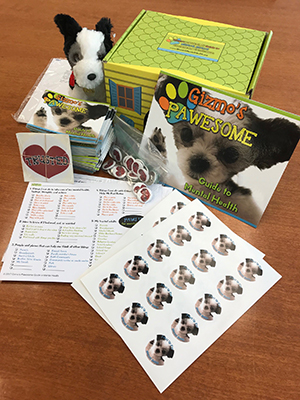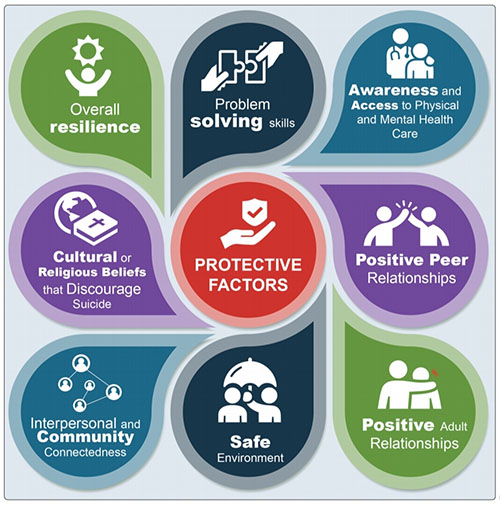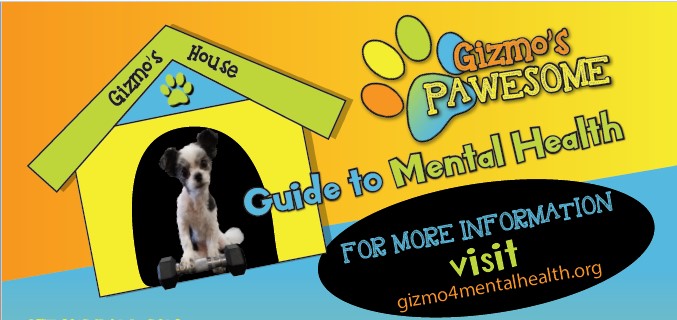About: This is a fun, flexible, turn-key curriculum for elementary youth in 3rd and 4th grade that introduces the Gizmo’s Pawesome Guide to Mental Health (Guide) using an animated Power Point of the Guide, implementer discussion guide, and required and optional activities for youth. It may be implemented in various settings, such as public/ private/ parochial/ therapeutic schools, treatment locations, camps, and before or after school programs.
The curriculum strives to help youth, their trusted adults, and the settings in which they live support their mental health and social emotional learning, and create a greater sense of individual and community connectedness thereby strengthening their mental wellness and reducing their risk of many negative health outcomes, but most importantly poor mental health and suicide.
The Gizmo Curriculum aligns with CASEL and MTSS, and supports Protective Factors.
Background: The Guide was developed to respond to a critical youth suicide prevention and mental health promotion education and service gap evidenced by the Connecticut data, and to support youth mental health literacy. Utilizing the evidence-based Safety Plan (Stanley and Brown, 2012) as the framework, the Guide introduces mental health and wellness knowledge and skills to youth at an early age with the hope that they may keep and apply what they learn for a lifetime to help them stay healthy and safe. These include:


- What is mental health;
- Mental health is equally as important as physical health;
- Daily activities that support mental health wellness;
- How to identify when mental health needs attention;
- Internal and external healthy coping strategies that support mental health;
- How to identify and connect with trusted adults; and
- Resources to share with trusted adults.
References:
CT Department of Public Health (2015). CT School Health Survey (2015, 2017). https://portal.ct.gov/dph/Health-Information-Systems--Reporting/Hisrhome/Connecticut-School-Health-Survey Stanley, B. & Brown, G. K. (2012). Safety Planning Intervention: A Brief Intervention to Mitigate Suicide Risk. Cognitive and Behavioral Practice, 19, 256-264. http://suicidesafetyplan.com/uploads/Safety_Planning_-_Cog___Beh_Practice.pdf
Gizmo’s bio: He is the mascot for the CT suicide prevention campaign- “1 WORD, 1 VOICE, 1 LIFE…Be the 1 to start the conversation,” and his fellow therapy dog and K9 First Responder friends use a warm and fuzzy approach to introduce youth to what can be a challenging subject for adults to discuss and for youth to understand. This approach makes the Guide engaging, memorable, and not only easy to use, but fun as well.
Gizmo’s Pawesome Guide to Mental Health Info Card
(Click here to order.)

“I am so happy to see this being addressed for our kids.”
“I think it has had a great impact on youth/school climate so students feel comfortable reaching out to trusted adults and likely feel the trusted adults are approachable.”
Click here to read more of what parents, students, and school staff have to say about the Curriculum.
| Prior to Curriculum Implementation: |
|---|
| Policies, Procedures and Protocols: Site policies, procedures and protocols related to early identification (screening and assessment), referral, connections to care, and follow-up should be updated using state standards, legislation, and national best practice guidance, and should include suicide prevention, intervention and response specifically. Please visit the Prevent Suicide CT website for school based resources and refer to the AFSP Model School District Policy on Suicide Prevention to review a safety protocol model for school policy and procedures. Staff Gatekeeper Training: Because we do not know who youth will identify as their Trusted Adult to go to when they need help, it is crucial that all site staff from support staff (i.e. administrative assistants, cafeteria workers, bus drivers, custodians) to administrators (i.e. Principals, Directors) and clinicians (i.e. Licensed, Certified) are trained at a minimum as Gatekeepers to recognize and respond to youth with mental health needs and who may be also be at risk for suicide. Your site/organization must complete a best practice youth mental health or suicide prevention gatekeeper training for the Trusted Adults onsite (e.g. Youth Mental Health First Aid, Question Persuade Refer, Talk Saves Lives, More Than Sad, safeTALK).
|
| NOTE: Before curriculum can be ordered, purchasers must submit this Attestation Form, affirming the Trusted Adults in their system have been trained in Gatekeeper Training. Please preview form in advance to ensure accurate completion. |
Ordering: After you submit your Attestation Form (see above), you will receive an email within 2 business days that contains the online ordering link and instructions.

December 2023: The Gizmo book and curriculum won a 2023 American Graphic Design Award from Graphic Design USA.

June 2022: The Association of Maternal & Child Health Programs (AMCHP) endorsed the Gizmo’s Pawesome Guide to Mental Health Elementary Curriculum as an Emerging Practice
Contact Us: For consultation, guidance, training information, or a copy of our evaluation report on Gizmo’s Pawesome Guide to Mental Health Elementary Curriculum ( 2020), please do not hesitate to Contact Us at: https://www.gizmo4mentalhealth.org/contact/